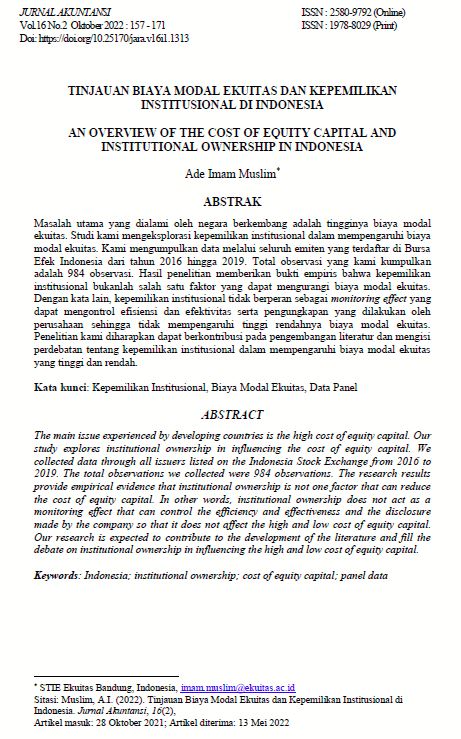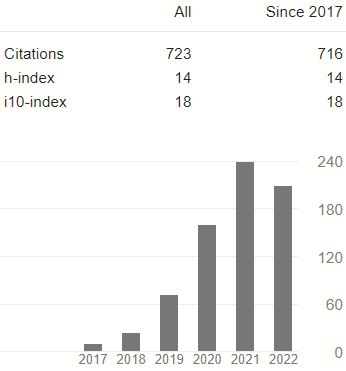TINJAUAN BIAYA MODAL EKUITAS DAN KEPEMILIKAN INSTITUSIONAL DI INDONESIA
DOI:
https://doi.org/10.25170/jak.v16i2.2952Keywords:
Biaya modal Ekuitas, Indonesia, Kepemilikan Institusional, Data PanelAbstract
The main issue experienced by developing countries is the high biaya modal ekuitas. Our study aims to explore institutional ownership in influencing the biaya modal ekuitas. For that purpose, we collected data through all issuers listed on the Indonesia Stock Exchange for the period 2016 to 2019. The total observations we collected were 984 observations. The research results provide empirical evidence that institutional ownership is not one factor that can reduce the biaya modal ekuitas. In other words, institutional ownership does not act as a monitoring effect that can control the efficiency and effectiveness and the disclosure made by the company so that it does not affect the high and low biaya modal ekuitas. Our research is expected to contribute to the development of the literature and fill the debate on institutional ownership in influencing the high and low biaya modal ekuitas.
References
Arslan, M., & Abidin, S. (2019). Nexus between corporate governance practices and cost of capital in PSX listed firms. Cogent Economics and Finance, 7(1). https://doi.org/10.1080/23322039.2019.1600222
Bhattacharya, U., & Daouk, H. (2016). The world price of insider trading. The Journal of FInance, 57(1), 75–108.
Chen, K. C. W., Chen, Z., & Wei, K. C. J. (2011). Agency costs of free cash flow and the effect of shareholder rights on the implied biaya modal ekuitas. Journal of Financial and Quantitative Analysis, 46(1), 171–207. https://doi.org/10.1017/S0022109010000591
Choi, J. H., & Lee, W. J. (2014). Association between big 4 auditor choice and biaya modal ekuitas for multiple-segment firms. Accounting and Finance, 54(1), 135–163. https://doi.org/10.1111/acfi.12011
Claessens, S., & Yurtoglu, B. B. (2013). Corporate governance in emerging markets: A survey. Emerging Markets Review, 15, 1–33. https://doi.org/10.1016/j.ememar.2012.03.002
Embong, Z., Mohd-Saleh, N., & Hassan, M. S. (2012). Firm size, disclosure and biaya modal ekuitas. Asian Review of Accounting, 20(2), 119–139. https://doi.org/10.1108/13217341211242178
Gana, (2020). Ownership structure and biaya modal ekuitas: Tunisian evidence. International Journal Business Governance and Ethics, 14(1), 96–121.
Gana, R. M., & Krichen, L. A. (2013). Audit committee and external audit quality: substitution or complementarity? Empirical evidence on euronext brussels. International Journal of Financial Management Research and Development, 3(2), 22–38.
Gao, H., Shen, Z., Li, Y., Mao, X., & Shi, Y. (2020). Institutional investors, real earnings management and cost of equity: Evidence from listed high-tech firms in China. Emerging Markets Finance and Trade, 56(14), 3490–3506. https://doi.org/10.1080/1540496X.2019.1650348
Ingram, M., & Margetis, S. (2010). A practical method to estimate the biaya modal ekuitas for a firm using cluster analysis. Managerial Finance, 36(2), 160–167.
Jirasakuldech, B., & Dudney, D. M. (2011). Financial disclosure, investor protection and stock market behavior: An international comparison. Rev Quant Finan Acc, 37, 181–205. https://doi.org/10.1007/s11156-010-0200-5
Khalifa, M., Zouaoui, H., Ben Othman, H., & Hussainey, K. (2019). Exploring the nonlinear effect of conditional conservatism on the biaya modal ekuitas: Evidence from emerging markets. Journal of International Accounting, Auditing and Taxation, 36, 100272. https://doi.org/10.1016/j.intaccaudtax.2019.100272
Khlif, H., Samaha, K., & Azzam, I. (2015). Disclosure, ownership structure, earnings announcement lag and biaya modal ekuitas in emerging markets. Journal of Applied Accounting Research, 16(1), 28–57. https://doi.org/10.1108/JAAR-06-2012-0046
Lakhal, F. (2006). Les mécanismes de gouvernement d’ entreprise et la publication volontaire des résultats en France. Comptabilite - Controle - Audit, 12(2), 69–92. https://doi.org/10.3917/cca.122.0069
Lim, M., How, J., & Verhoeven, P. (2014). Corporate ownership, corporate governance reform and timeliness of earnings: Malaysian evidence. Journal of Contemporary Accounting and Economics, 10(1), 32–45. https://doi.org/10.1016/j.jcae.2013.11.001
Markowitz, H. (1952). Portfolio selection. The Journal of Finance, 7(1), 77–91. https://doi.org/10.1111/j.1540-6261.1952.tb01525.x
Setiawan, D., & Phua, L. K. (2013). Corporate governance and dividend policy in Indonesia. Business Strategy Series, 14(5–6), 135–143. https://doi.org/10.1108/BSS-01-2013-0003
Sharpe, W. F. (1964). Capital asset price: A theory of market equilibrium under condition of risk. The Journal of Finance, XIX(3), 425–442. https://doi.org/10.1111/jofi.12742
Thijssen, P., & Iatridis, G. E. (2016). Conditional conservatism and value relevance of financial reporting: A study in view of converging accounting standards. Journal of Multinational Financial Management, 37–38, 48–70. https://doi.org/10.1016/j.mulfin.2016.10.001

Downloads
Published
Issue
Section
License
Authors who publish with this journal agree to the following terms:
- Authors retain copyright and grant the journal right of first publication with the work simultaneously licensed under a Creative Commons Attribution-ShareAlike 4.0 International License that allows others to share the work with an acknowledgment of the work's authorship and initial publication in this journal.
- Authors are able to enter into separate, additional contractual arrangements for the non-exclusive distribution of the journal's published version of the work (e.g., post it to an institutional repository or publish it in a book), with an acknowledgment of its initial publication in this journal.
- Authors are permitted and encouraged to post their work online (e.g., in institutional repositories or on their website) prior to and during the submission process, as it can lead to productive exchanges, as well as earlier and greater citation of published work.














